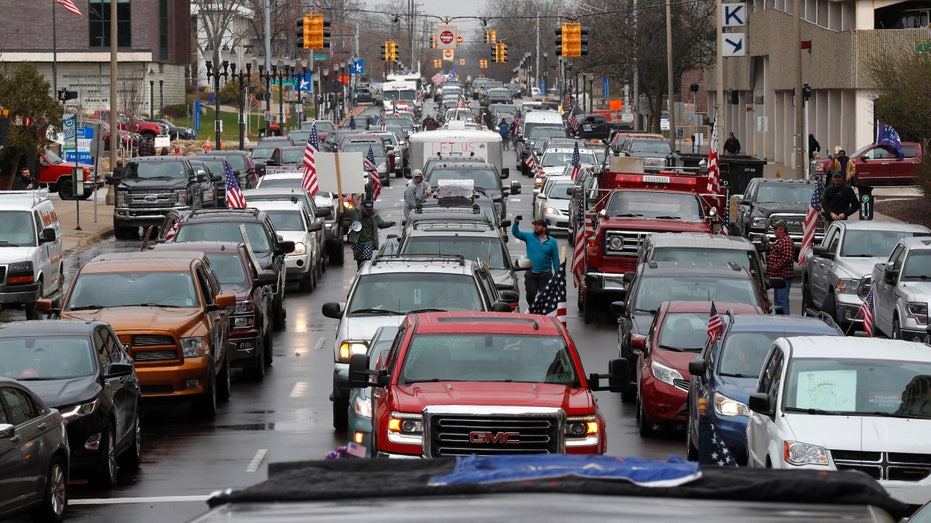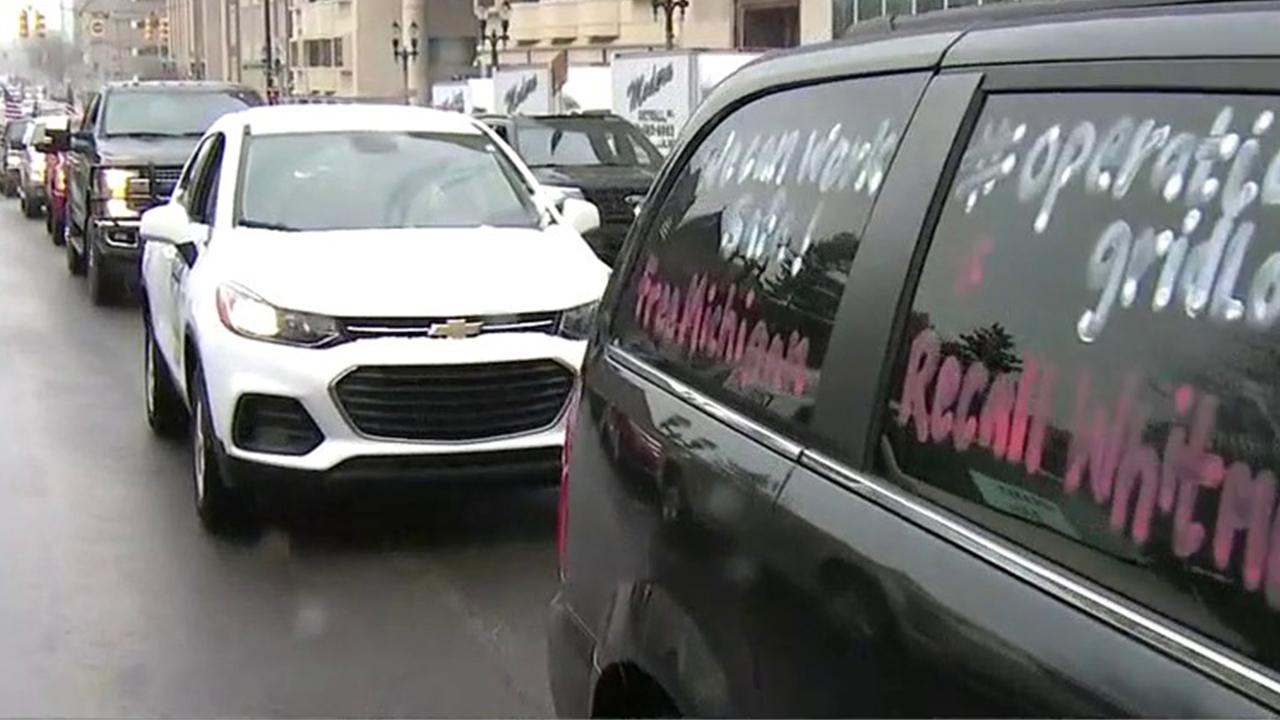Lansing, Michigan protests should not surprise us -- There are real risks from aggressive, prolonged lockdowns
Draconian state lockdown orders – if allowed to continue too long – threaten the voluntary law-abiding character of the American people
Get all the latest news on coronavirus and more delivered daily to your inbox. Sign up here.
Wednesday’s protests in Michigan show that draconian state lockdown orders – if allowed to continue too long – threaten the voluntary law-abiding character of the American people.
State governors, who truly control whether the economy stays open or shut, must better explain their reasons for their trade-offs between slowing the spread of the coronavirus pandemic versus throwing millions out of work and destroying billions in economic activity.
CORONAVIRUS LOCKDOWN PROTESTERS 'GRIDLOCK' MICHIGAN STREETS
If their people disagree, these leaders risk sparking civil disobedience that will undermine their political and legal systems.
Michigan’s Conservative Coalition organized what was called “Operation Gridlock” Wednesday, in which members drove their cars throughout the state capital city, Lansing, to protest the lockdown ordered by governor Gretchen Whitmer.
According to Fox News, “demonstrators blasted their horns, waved Americans flags and hoisted placards deriding Whitmer’s orders and demanding that she reopen the state’s economy.”

Vehicles sit in gridlock during a protest in Lansing, Mich., Wednesday. (AP Photo/Paul Sancya)
Whitmer has ordered one of the most aggressive lockdown orders in the nation by banning all gatherings regardless of size or family ties, and even individual visits between family or friends (unless they are providing care).
CORONAVIRUS SHUTDOWN PROTESTS POP UP ACROSS THE COUNTRY
Under our Constitution, only states possess the “police power,” which gives them the authority to regulate virtually everything within their boundaries.
As the Supreme Court has long recognized, the most compelling use of state power is to protect public health and safety. Only the states may impose broad quarantines, close institutions and businesses, and limit movement and travel.
We elect state officials to make terrible trade-offs for us but in a responsible and informed manner. If they do not explain how and why they arrived at their decision, they risk popular discontent.
But because state government sits closer to the people, voters can demand immediate transparency and accountability for these potentially devastating policies. They may impede the spread of the disease, but we cannot tell if it comes at an acceptable cost because governors like Whitmer, Gavin Newsom in California, or Andrew Cuomo in New York have not explained how they made the cost-benefit trade-off.
Here is a quick, back-of-the-envelope calculation that demands an answer from these governors. The U.S. economy generates approximately $24 trillion a year in GDP, or $2 trillion a month. California is about 15 percent of that total, for about $300 billion per month.
Suppose that the lockdown causes economic activity to drop by 75 percent in California (it may well be worse). Is it worth losses of $225 billion per month, in just one state, to reduce the spread of the coronavirus?
NUMBER OF MORTGAGE LOANS IN FORBEARANCE JUMPS, SURVEY SHOWS
Should the states spend several millions to save a single life? Those are just immediate losses, and prolonged lockdowns raise the risk of a permanent reduction in the size of the American economy such as occurred during the Great Depression.
Critics will say that opening up the economy will cost lives. But that choice, between lives and allowing economic activity and growth, lies at the heart of many public policy choices. When the federal government raises the fuel efficiency standards for cars, that choice will lead to more deaths in traffic accidents due to lighter auto designs.
The money lost from the lockdowns would otherwise allow millions of families – many of them living paycheck to paycheck – to earn a living.
GET FOX BUSINESS ON THE GO BY CLICKING HERE
Did state officials consider less intrusive measures, such as quarantining the identified infected and safeguarding the elderly, who are most vulnerable to the illness, instead of imposing a shutdown of the state’s economy?
Did they consider the harms of the mandatory stay at home order, including increases in depression and anxiety, drug use, domestic violence, and suicide?
These are tough decisions. States like Michigan or California cannot spend unlimited amounts to stop the spread of the coronavirus.
In the 2017-18 flu season, the CDC estimates that 61,000 Americans died of influenza; but we do not impose severe economic lockdowns to stop the flu.
We elect state officials to make these terrible trade-offs for us but in a responsible and informed manner. If they do not explain how and why they arrived at their decision, they risk popular discontent.
If the lockdown continues for weeks on end, and it appears that our leaders imposed statewide quarantines without sufficient proof that the numbers of lives saved would justify the heavy, widespread cost, they even risk civil disobedience where Americans will simply ignore the bans on social and economic activity.
No state has enough manpower to control an unwilling American population and it may take years to rebuild the trust between the voters and their representatives necessary for effective government.
CLICK HERE TO READ MORE ON FOX BUSINESS
John Yoo is the Heller Professor of Law at the University of California at Berkeley, a visiting fellow at the Hoover Institution, and a visiting scholar at the American Enterprise Institute. A former official in the Bush Justice Department, he is the author of the forthcoming "Defender-in-Chief: Donald Trump’s Fight for Presidential Power" (All Points Books, July 28, 2020).




















